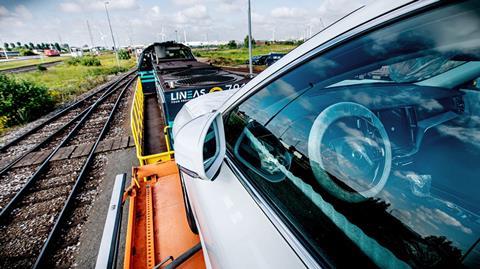Overcoming the disruptions caused to the automotive industry over the last 12 months by the Covid pandemic has revealed the importance of long-term partnerships between OEMs, and their parts and logistics suppliers. What is more, at this year’s Automotive Logistics and Supply Chain Europe conference, carmakers talked about how important those long-term partnerships are going to be if the industry is to clean up its act and become more sustainable.

Short-term tenders for logistics services drive cost efficiencies through competition but too much change between partners weakens a deeper understanding of where supply chain savings can be made in the long term.
Hans Cremers, senior manager of supply chain purchasing at Toyota Motor Europe, said the companies with which the carmaker had a longer history had been crucial in supporting Toyota through the recent crisis.
“They have been absolutely amazing in supporting the business in terms of providing the flexibility to scale up resources at short notice when required, or scaling down and putting numbers on furlough to protect the entire supply chain from cost impact,” he said.
Volvo Cars’ Martin Corner, corporate vice-president of supply chain management, agreed.
“I think it goes for parts suppliers, OEMs and logistics companies to really have that longer-term, shared-volume plan and vision,” he said
In the face of a crisis, a parts or logistics supplier’s ability to understand how its OEM customer’s business works can be the difference between success or failure. What has been proven through the Covid disruption, and what is clear through ongoing related problems such as the current semiconductor shortage, is that the partnership model needs to be developed further.
Watch more dicussions from ALSC Europe Live
Multi-channel suppliers
Added to that is the fact that the traditional architecture of the vehicle is changing and becoming more digital by the day. With that so are the type of suppliers involved, which are increasingly more high tech and which do not operate on the same supply chain principles that automotive has always exemplified.
“Now we are competing with software and technology companies, such as Apple and those that make smart TVs,” noted Corner. “We are in a different world and have been exposed by our one-dimensional, lean, JIT [just-in-time] supply chains.”
Both Toyota and Volvo recognise that lessons have been learned through the crisis in terms of closer collaboration with suppliers and that the industry is at a potential tipping point, something influenced by the change in the make up of those suppliers. Rather than fall back into old habits in the wake of the disruption, it is time to grasp the change from a logistics point of view as well, according to Corner, not the least for the sustainability goals that carmakers are now chasing.
“When we talk about backflows and logistics network design, provided we don’t compromise competition law… we have got to start working together with our logistics networks and take waste out of the system – that is a big driver of sustainability,” he said.
You can also look at intermodal decisions and alternative fuels but probably the best way to reduce CO2 emissions is by not running the kilometres at all – Hans Cremers, Toyota Motor Europe
Cutting kilometres
Carmakers are looking at new ways logistics can match the environmental goals of the products they are moving and the best way to do that is by taking out empty miles, both by better and more collaborative, multimodal network design, and through better localisation.
Corner said that Volvo was pushing for a greater multimodal strategy, something it had had success with in terms of ocean vessel and train interconnections in Europe and on east-west routes, but he said it only went so far. The answer to cutting emissions was cutting distance, something put in start relief when battery cell deliveries were taken into consideration.
“Battery cells are a nightmare,” said Corner. “The truck is only 25% full. You increment that by every kilometre those cells have got to travel to the point of the battery pack construction, it is not nice at all when you look at the forward projection.”
Cremers pointed out that Toyota was now making parts-sourcing decisions based on their carbon impact.
Sustainability and the logistics cost of inventory reduction – they are the dynamics and challenges we are facing right now
“We quantify in a euro value the emissions that will come from logistics, from the transport used between supplier and our factory,” he said. “That is part of the total cost of ownership on which we make the decision. Naturally that applies to suppliers that are closer to our manufacturing plants to be more competitive.”
Corner acknowledged that the success of its global supply chain in the past depended on a longer logistics chains but said the more volume that grew on that footprint the bigger the CO2 output. That did not tie in with Volvo’s firm commitment to sustainability.
“Our CEO… has made a firm commitment that sustainability will be a part of Volvo’s core value [to that extent] that safety has been in the past,” he said.
That again came down the kilometres travelled as much as the use of biofuels in transport.
“Sustainability and the logistics cost of inventory reduction – they are the dynamics and challenges we are facing right now,” said Corner. “It is a firm commitment and we have to find a solution very fast.”
At the end of the day, sustainability depends on a blend of service solutions, including cutting kilometres, shifting modes of transport and the use of alternative fuels.
“What we have to aim at as an industry is to see what technologies are going to be the new future standard and where does it make sense to invest,” said Cremers.
Sensible investment depends on longer-term arrangements with logistics providers that have wider expertise based on exposure to a range of industry sectors, including those in new technologies.
Watch the full discussion with Hans Cremers and Martin Corner in disucssion with ChrisTopher Ludwig









































No comments yet